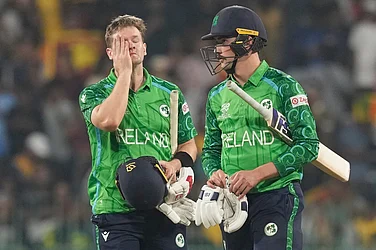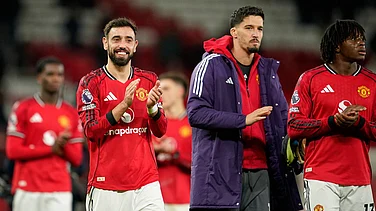It is well-known that international matches rouse national passions to feverish levels, as witnessed in last year's football World Cup in France. We saw how citizens of Latin America prayed in churches. Football fans in Britain are notorious for their riotous behaviour. Cricket fans are peaceful by contrast, though the tendency to hurl bottles and other missiles at fielders near the boundary, is increasing in South Asia and the West Indies.
Apropos of the linkage between politics and cricket, Star Plus is re-telecasting Bodyline, which narrates the story of the successful effort made by the English cricket team led by D.R. Jardine in the early 1930s to regain the Ashes from their traditional rivals, the Australians. Jardine devised a strategy in which his team of fast bowlers including the great Harold Larwood, and W. Voce and W.E. Bowes, bowled bumpers to Australian batsmen with three or four fielders standing close by. Batsman trying to protect their bodies from the menacing sizzlers offered easy catches to the fielders. The entire strategy was aimed at preventing the great Don Bradman from making big scores. Bradman was able to score only one century, in the second Test at Melbourne when he scored 103 not out, and Jardine and his team won the series. In the process, the enormous tension soured relations between Britain and Australia, and efforts were made by the British government to persuade Jardine to give up bodyline bowling. Jardine refused. He was a tough man.
The long and the short of it is that sports, including cricket, cannot be separated from politics, and it is my contention that precisely because of this linkage India has to make sure that Shiv Sainiks are prevented from sabotaging Test matches between India and Pakistan.
The situation between India and Pakistan changed irreversibly in May 1998 when both sides exploded nuclear devices. A full-scale war between the two is now unthinkable for the simple reason that it means the destruction of towns and cities on either side involving death and damage to millions of innocent people. Both sides must do their utmost to prevent such a situation. Steps have to be taken to de-escalate. Prime Minister Vajpayee's offer of a no first strike to Pakistan at the saarc meeting in Colombo in July 1998 was indeed wise. The fact that talks are going on between India and Pakistan is welcome. The lowering of trade barriers, and easing visa restrictions, are the other steps. The bus service between Delhi and Lahore must be regarded as symbolic of the new turn in relations.
We must view the forthcoming Indo-Pak Tests as a confidence-building measure between the two. For those who may be tempted to laugh at this I would like to point out that the thaw in Sino-US relations in the 1970s began with ping-pong (table tennis) matches between the two. Since the West tends to admire everything the Chinese do, this was hailed as ping pong diplomacy. Let us also remember that South Africa's emergence from the darkness of apartheid was symbolised by its re-entry into international cricket.
Ten years from nowif not earlierSouth Asia may be a free trading zone, just like Western Europe. India must make every effort to make this happen. This cannot be done without peace being established with Pakistan. We must also not forget our long-standing demand for universal nuclear disarmament. Our acquiring nuclear weapons must make us work determinedly for the goal.
I come back to my main point. It is precisely because sports and politics are intimately linked that we must make sure that Indo-Pak Test matches take place. The government must provide security to the Pakistani players and fans. The bcci should publish and telecast messages requesting fans to allow the matches to take place in an atmosphere of peaceful competition. When the players and others accompanying them return to Pakistan feeling that they have been treated well by their Indian hosts, the gain is not merely emotional but also political, and to both countries.
(India's best known sociologist M.N. Srinivas bowled legspin and captained 'Bradman XI' as a teenager in Mysore in 1928-30)


























